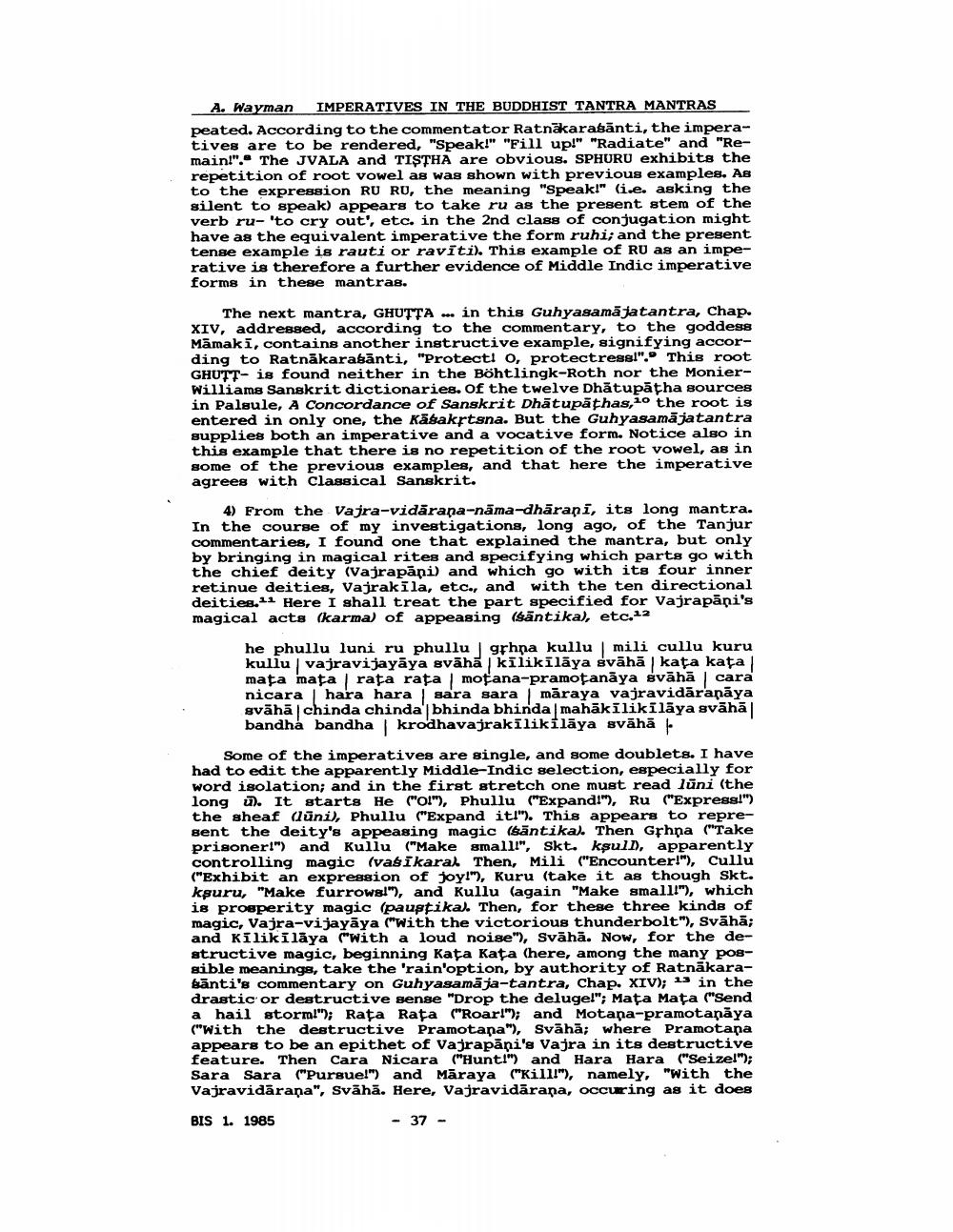Book Title: Imperatives In Buddhist Tantra Mantras Author(s): Alex Wayman Publisher: Alex Wayman View full book textPage 3
________________ A. Wayman IMPERATIVES IN THE BUDDHIST TANTRA MANTRAS peated. According to the commentator Ratnakarafānti, the imperatives are to be rendered, "Speak!" "Fill up!" "Radiate" and "Remain!". The JVALA and TISTHA are obvious. SPHURU exhibits the repetition of root vowel as was shown with previous examples. As to the expression RU RU, the meaning "Speak!" (i.e. asking the silent to speak) appears to take ru as the present stem of the verb ru- 'to cry out', etc. in the 2nd class of conjugation might have as the equivalent imperative the form ruhi; and the present tense example is rauti or raviti). This example of RU as an imperative is therefore a further evidence of Middle Indic imperative forms in these mantras. The next mantra, GHUTTA - in this Guhyasamājatantra, Chap. XIV, addressed, according to the commentary, to the goddess Māmakī, contains another instructive example, signifying according to Ratnākarabanti, "Protecti o, protectress!". This root GHUTT- is found neither in the Böhtlingk-Roth nor the MonierWilliams Sanskrit dictionaries. Of the twelve Dhātupātha sources in Palsule, A Concordance of Sanskrit Dhātupathas, 10 the root is entered in only one, the Kāsakrtsna. But the Guhyasamājatantra supplies both an imperative and a vocative form. Notice also in this example that there is no repetition of the root vowel, as in some of the previous examples, and that here the imperative agrees with Classical Sanskrit. 4) From the Vajra-vidārana-nama-dhārani, its long mantra. In the course of my investigations, long ago, of the Tanjur commentaries, I found one that explained the mantra, but only by bringing in magical rites and specifying which parts go with the chief deity (Vajrapāni) and which go with its four inner retinue deities, Vajrakila, etc., and with the ten directional deities.11 Here I shall treat the part specified for Vajrapāni's magical acts (karma) of appeasing (Säntika), etc.a2 he phullu luni ru phullu gfhna kullu mili cullu kuru kullu vajravijayāya svāhā kilikīlāya svāhā kata kata mata mata rata rata | motana-pramotanaya gvāhā | cara nicara hara hara | sara sara | māraya vajravidār'anāya gvāhā chinda chinda' bhinda bhinda mahākilikilāya svāhā| bandha bandha krodhavajrakilikilāya svähā | Some of the imperatives are single, and some doublets. I have had to edit the apparently Middle-Indic selection, especially for word isolation; and in the first stretch one must read luni (the long ū). It starts He ("o!"), Phullu ("Expand!"), Ru "Express!") the sheaf (lūni), Phullu ("Expand it!"). This appears to represent the deity's appeasing magic (Santika). Then Gphna ("Take prisoner1") and Kullu ("Make smalli", Skt. kşull), apparently controlling magic (vas ikaraThen, Mili ("Encounter!"), Cullu ("Exhibit an expression of joy!"), Kuru (take it as though Skt. ksuru, "Make furrows!"), and Kullu (again "Make smalll"), which is prosperity magic (paustikal. Then, for these three kinds of magic, Vajra-vijayāya ("With the victorious thunderbolt"), Svāhā; and kilikilaya "With a loud noise"), Svāhā. Now, for the destructive magic, beginning Kata Kata (here, among the many possible meanings, take the 'rain'option, by authority of Ratnakarabānti's commentary on Guhyasamāja-tantra, chap. XIV); 13 in the drastic or destructive sense "Drop the delugel"; Mata Mata ("Send a hail storm!"); Rata Rata ("Roar!"); and Motana-pramotanaya ("With the destructive Pramotana"), Svāhā; where Pramotana appears to be an epithet of Vajrapāni's Vajra in its destructive feature. Then Cara Nicara ("Hunt!") and Hara Hara ("Seizel"); Sara Sara ("Pursuel") and Māraya ("Killl"), namely, "With the Vajravidārana", Svāhā. Here, Vajravidārana, occurring as it does BIS 1. 1985 - 37 -Page Navigation
1 2 3 4 5 6 7
